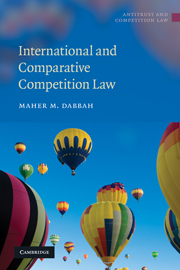Book contents
- Frontmatter
- Contents
- Preface
- List of abbreviations
- Table of Cases
- Table of Statutes
- Table of Regulations
- 1 Introduction
- 2 The internationalisation of competition law: concepts, ideas, options and players
- 3 The involvement of international bodies and organisations in the field of competition law and policy
- 4 EU competition law regime
- 5 US competition law regime
- 6 Competition law and policy in developing countries
- 7 Regional competition law and policy
- 8 The unilateral option: extraterritorial assertion of jurisdiction
- 9 The bilateral option: cooperation between competition authorities
- 10 The multilateral option: cooperation through binding and non-binding commitments
- 11 Competition and trade policy
- Bibliography
- Index
6 - Competition law and policy in developing countries
Published online by Cambridge University Press: 05 June 2012
- Frontmatter
- Contents
- Preface
- List of abbreviations
- Table of Cases
- Table of Statutes
- Table of Regulations
- 1 Introduction
- 2 The internationalisation of competition law: concepts, ideas, options and players
- 3 The involvement of international bodies and organisations in the field of competition law and policy
- 4 EU competition law regime
- 5 US competition law regime
- 6 Competition law and policy in developing countries
- 7 Regional competition law and policy
- 8 The unilateral option: extraterritorial assertion of jurisdiction
- 9 The bilateral option: cooperation between competition authorities
- 10 The multilateral option: cooperation through binding and non-binding commitments
- 11 Competition and trade policy
- Bibliography
- Index
Summary
Introduction
The phenomenal geographical expansion of competition law in recent years has been most noticeable in the developing world. As we noted in the first chapter, this expansion has occurred against the backdrop of the economic transformation witnessed worldwide and which has led to an increased reliance on the market mechanism. The impact of this shift has been particularly felt in developing countries, many of which have been taking remarkable steps in replacing their centrally planned economies with ones based on free-market philosophy. Considerable work however remains to be done in many parts of the developing world in this regard in order to bring about meaningful and sustainable privatisation, which could in turn contribute to advancing economic and technical development; an equal if not greater amount of work is needed in the field of competition law.
What is meant by ‘developing countries’?
The question of what is a ‘developing country’ and whether this is an appropriate way to describe a country that is not developed itself can be discussed in a chapter of its own if not an entire book. Some people would argue that the use of the concepts of developed and developing countries may not be the best way to categorise countries and for this reason many international institutions, governments and people have shown a preference towards the term ‘less developed countries’ (LDCs) to describe countries which are not developed; and there are those who use the term ‘newly industrialised countries’ to refer to these countries.
- Type
- Chapter
- Information
- International and Comparative Competition Law , pp. 275 - 365Publisher: Cambridge University PressPrint publication year: 2010
- 1
- Cited by



